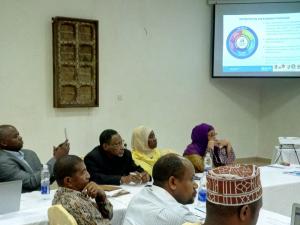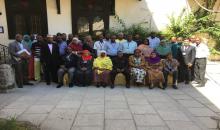WHO supports validation and costing of the National Action Plan for Health Security for Zanzibar
Zanzibar, 18-22 June 2018: Today, we are challenged by a variety of epidemics and health emergencies. A robust health system that is effective, inclusive and a well-coordinated multisectoral approach is essential to protect human and animal health; and ensure national development goals are not adversely affected by public health threats.
In 2017, the IHR (2005) core capacities for Zanzibar were assessed, first by an internal self-assessment team, followed by a Joint External Evaluation (JEE), which was supported by external experts from WHO, the CDC and other experts from other Member States and partner organisations. The JEE noted Zanzibar achievements and gaps in the 19 Technical Areas and made specific recommendations for the priority actions needed by Zanzibar.
To this end, WHO supported the MOH Zanzibar to convene a 5 day meeting to validate and cost its National Action Plans for Health Security (NAPHS). The NAPHS is aligned with Sustainable Development Goals (SDG) 3 indicator 3.d.1 (International Health Regulations (IHR) capacity and health emergency preparedness), and the efforts to reach this goal will make Zanzibar better prepared for health public health emergencies by measurably increasing resilience of health systems and improving public health response to public health emergencies.
The Hon. Minister for Health, Hamad Rashid Mohamed (MP), who was the Guest of Honour, officially opened the working session. Other presents were the Deputy Minister, Hon. Harusi Saidi Sulemani (MP) and the Principle Secretary Ms. Asha A. Abdula. In his opening remarks, the Guest of honour highlighted the danger Zanzibar is facing on infectious diseases due to frequent travellers coming in and out of the country. saying that has posed challenges in malaria elimination efforts .
He highlighted the commitment of the government as signatories to the IHR 2005 and that Zanzibar needs to strengthen its preparedness and response capacity to all public health events including chemical and radiological events. The minister added that as a custodian of health they will continue working with partners, thanking their support but requesting the collaboration to continue urging them to support Zanzibar in using the final NAPHS to mobilize resources both human and financial. Finally, he requested the participants to work on finalise the plan.
WHO remarks were delivered by NPO/DPC on behalf of WR congratulating the Ministry of Health and all other sector Ministries and partners in Zanzibar for this very important milestone. The remarks narrated that in May 2016, the World Health Assembly (WHA) requested WHO to develop a global implementation plan to promote the delivery of the International Health Regulations (2005), linking this to the recent World Health Assembly which approved the Thirteenth General Programme of Work (GPW13) during its seventy-first session in May 2018. GPW13 sets three strategic priorities, ties them to ambitious SDG-based goals for driving progress, and addresses health emergencies – targeting 1 billion more people better protected from health emergencies as one of the triple billion. The remarks ended by stressing that the costed NAPHS for Zanzibar will contribute towards a safer country, a safer region and a safer world.
To start the ball rolling on the review and costing of the Zanzibar NAPHS, it was reported that WHO recently developed a 3-step strategic NAPHS Framework intended as a flexible approach to help countries in their inception, development which include costing, and implementation of NAPHS. NAPHS remains as a country-owned, country-led and country-developed health security plan, the sustainability of which can be ensured by anchoring it into the national strategic landscape and budget cycle.




